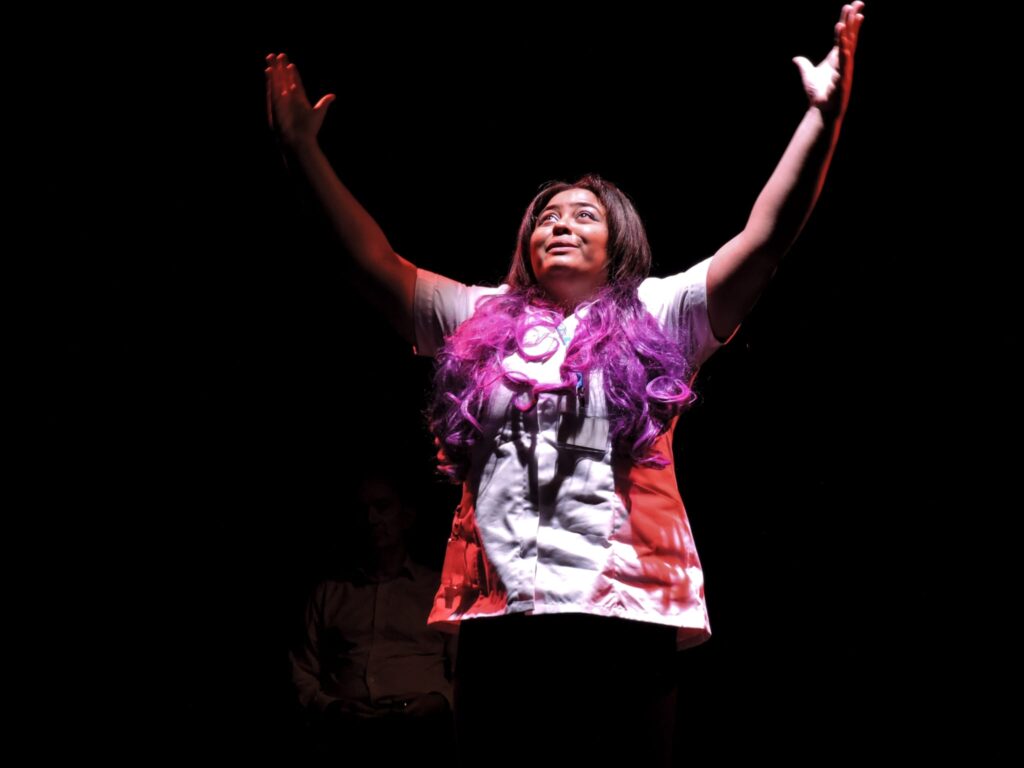Lear in Brexitland, by Tim Prentki, was written in 2017, and was revised after an invited audience responded to a script reading at Shakespeare North Playhouse Gallery (April 2023). King Lear is old and worn down by responsibilities, and set on dividing his troublesome kingdom, Britain, in three. We meet him in an NHS ward, where his Fool dishes out criticism and unwelcome advice. A young construction-site accident victim wakes up to life after Brexit, and an Asian nurse and a Polish consultant upset his ideas of Britishness.

Prentki’s script explores what it means to be British today, using scenes involving Shakespeare’s King Lear and his Fool alongside Lee Smith who, badly injured at work, finds himself in the next hospital bed to the demented and increasingly angry Lear. Lear rages at chaos in his kingdom, to which his own actions have led, a fact his Fool never lets him forget. Lee is in constant pain from his back injury and lashes out in rage at his British-Gujarati nurse and British-Polish consultant. Their calm responses to his furious prejudice, and the quality of the care they give him, confuse him.

Lear’s despair is initially matched by Lee’s self-pity, but big questions from Shakespeare’s 17th century turn out to be important to us now. As he thinks them through, Lee wonders if we can ever know who we are, and who we might be, if we don’t try to understand where we’ve come from.
We held an audience discussion on each of the seven nights of the run and people’s responses included the following observations,
The Shakespearean side made sense even without the original context of King Lear because of the inclusion of the contemporary side.
Powerful, really enjoyed it.
Brave, because some would view the show as controversial. In today’s society, the middle ground isn’t there, there are two sides and that’s it.
We don’t know people as deeply anymore because of today’s society, social media, etc. It was nice to have time to understand people on a deeper level, and see the human connection.
Class underlies the play. The bitterness of Lee is rooted in him not being able to earn.
I know people exactly like Lee, his attitude was shocking, but it was good to see it shown.
As you learn more you realise if you were in Lee’s position you might have formed the behaviour he exhibits.
Ignorance meets economic crisis in Lee’s character and he kicks back. What if that was me?
Beautiful performance, makes the audience understand him – the journey is his. Lee is Lear in Brexitland. His performance brings the audience in and makes them sympathise with him.
Lee is Lear and the Fool, he is England. We need to look at Lee and understand him to understand what’s happening in our country.
Brexit has brought certain things into focus. Could you imagine playing this play ten years back at a time, after World War II, in the 50s, 60s, 70s, for example? How would it impact, how would audiences respond?
I’ve seen King Lear lots of times and never noticed the Fool is a carer for Lear. This really adds to what the Fool is.
When the Fool dies, there’s a loss of communication. The Fool is the connection between everyone, helping them to voice their stories. It feels like we don’t have that anymore – no middle ground, but the Fool is a bridge between two worlds.
I am a Ugandan Asian, my children were born here and question their identity. It’s a complex topic that needs to be explored. How do we define who we are? Having the conversation with young people is important.
A lot of people don’t know that half of the pilots who flew in the RAF in World War II weren’t British, and it’s good to recognise that. We won the war, but who are ‘we’?
In finding your own identity there’s a lashing out against other identities.
Alisha and Krysia convey the compassion and dignity of NHS workers.
The delivery of Alisha’s lines was beautiful, she dealt with Lee really well, almost like a parent teaching a child.
Alisha used her grandad’s tools to deal with Lee’s racism. The moment when she told Lee to take care despite everything was poignant.
I am a nurse, and there’s an expectation to not challenge aggressions, so it was interesting to see Lee’s racism challenged subtly. It produced a power dynamic that furthered the relationship between the clinical staff and the patient. I was really struck by the warmth from medical professionals as Lee is discharged.
What will happen to us? Will we find our philosophies in time? ENDS
